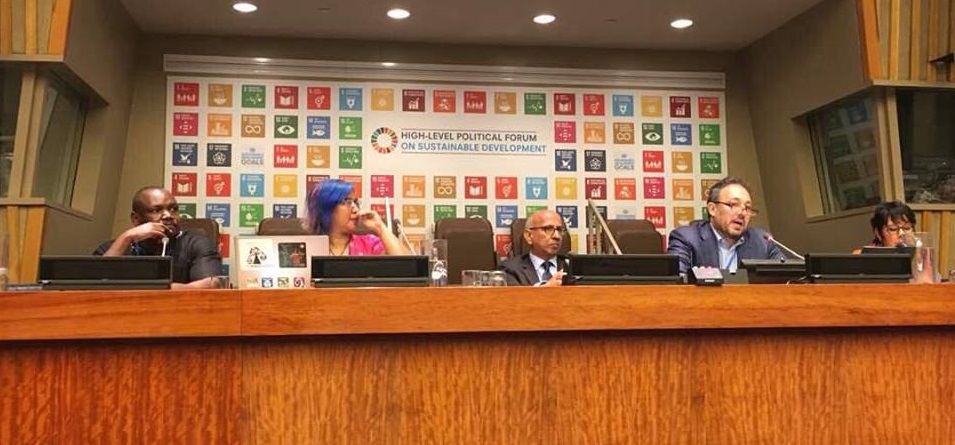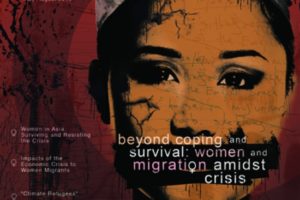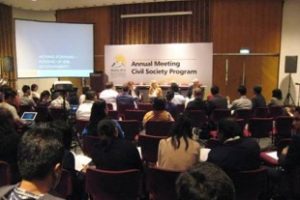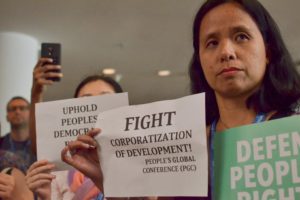[[{“type”:”media”,”view_mode”:”media_original”,”fid”:”2082″,”attributes”:{“alt”:””,”class”:”media-image”,”height”:”445″,”style”:”width: 600px; height: 280px;”,”typeof”:”foaf:Image”,”width”:”955″}}]]Photo: CSO FfD side-event on the structural barriers to sustainable development "means of implementation," with conversations on how the global economy “fails us in recession and fails us when it works”
IBON International Update #1
Development for the People
July 9-13, New York – The High Level Political Forum (HLPF) on Sustainable Development is convened annually to review progress and implementation of the sustainable development goals (SDGs). For this year, various meetings were held at the UN headquarters in New York since 9 July and until 18 July 2018. The SDGs were adopted in 2015, and which for some indicate an ambitious international development agenda tackling both poverty and environmental challenges within the United Nations system.
The HLPF is held with a “thematic week,” where the trajectories of particular SDGs are supposedly assessed in official sessions where representatives of state, civil society and even the private sector are present. According to the President of the UN Economic and Social Council, the HLPF featured 80 government representatives and 2500 non-state actors.
With this year’s theme being about “transformation toward sustainable and resilient societies,” the HLPF official sessions during this thematic week focused on the SDGs concerning water and sanitation (SDG 6); affordable, sustainable and modern energy (SDG 7); inclusive cities and human settlements (SDG 11); sustainable consumption and production patterns (SDG 12); sustainable use and management of forests, land and terrestrial ecosystems (SDG 15). Finally there is the “means of implementation” goal (SDG 17) that is covered every year, which concerns the nitty-gritty on doing development:multi-stakeholder partnerships, trade issues, as well as how to finance development.
It is with awareness that some civil society organisations (CSOs) admit that the HLPF is a space that, from its first day, already has limits – due to the barriers grassroots organisations had to hurdle before being considered eligible to attend. While working with other CSOs through the “major group” system helps many organisations to orient themselves, a large number of CSOs only have the opportunity to actively speak as stakeholders in either five-minute or two-minute portions on the floor.
Thus compared with state representatives and the “stakeholders” from finance institutions, many CSOs would be compelled to voice out concerns that are closest to what’s happening on the ground. On the third day, for instance, Emele Duituturaga of Pacific Islands Association of Non-Government Organisations (PIANGO) asked a question during the session on small-island developing states (SIDS): "Is resilience and sustainability achievable with the predominant neoliberal capitalist framework that is prevalent in most SIDS’ economies?"
For our part, we asked during the session on sustainable consumption and production (SCP), “How would the [proposed national level implementation of SCP] affect current investment rules adopted by many Southern countries?” The prospects of SCP would of course be different in Southern contexts where investment liberalisation and de-regulation has weakened national rules that could have stopped unsustainable big business practices. This makes it difficult for policy to be coherent with the requisites of SDG 12, or for any policy to promote “sustainable production”.
Civil society has also raised the issue of enabling environment. Alma Sinumlag of Cordillera Women’s Education, Action Research Center (CWEARC) raised, for instance: "How can we step forward toward sustainable and resilient communities when millions in our region have been fleeing their villages due to militarisation that pave way for plunder of natural resources?” The challenge of pushing for development that is owned by peoples at the grassroots is also a crucial concern that cropped up.
These are the questions and concerns that are usually left unaddressed by state representatives and panellists from international institutions. They expectedly focus their inputs mostly on how they are implementing the SDGs in terms of policy and programs, and on what kinds of technological, financial and institutional solutions would be wise for countries to adopt. With some exceptions, many government representatives take for granted that it is desirable to have greater private sector roles within economies and within “development.” CSOs from both global North and South have in many instances pointed the need to move beyond this unsustainable economic model that is premised on relentless economic growth.
Voices that tackled how dominant economic paradigms carry over into the SDGs were heard in CSO-held events. The CSO Financing for Development (FfD) group held a side-event on “structural barriers” to SDG 17, which faced head-on how the global economy “fails us in recession and fails us when it works.” In this side-event we intervened to point out that multilateral development banks, particularly the World Bank Group and the Asian Development Bank, are active in forwarding more private sector solutions, where the same structural assumptions are forwarded within “promoting” the SDGs.
Part of this current dominant narrative is the “maximizing finance for development” approach of the World Bank, where public finance will only be used when all means for private sector investments are exhausted. Another part would be so-called “blended finance” arrangements, where official development assistance (ODA) – supposedly for public benefit – is used to encourage more private investment. These especially gloss over the fact that a large number of countries from the Organisation for Economic Cooperation and Development are off the mark from the supposed global ODA commitment of 0.7% of country GNI, which was mentioned during the HLPF. Meanwhile, Southern and BRICS governments seem to passively accept the narrative that promotes the big international private sector even further.
On 13th July, the last day of the HLPF thematic week, a side-event on the private sector was organised by Brot für die Welt, Misereor, among other concerned groups. In this, civil society raised their concerns regarding privatisation, public-private partnerships in the delivery of social infrastructure such as water and transport.
Many important questions remained as the week ended. How could grassroots organisations forward development that addresses their concrete needs, given the challenges of HLPF participation, and even the worsening state of enabling environments for civil society around the world? During the CSO FfD group side-event, an important way forward was indicated: for CSOs and grassroots organisations to strengthen their organising, not necessarily within the official HLPF platform. For us, this would mean to raise people’s development concerns and forward alternative development paradigms that are founded on people’s rights and sovereignty – pointing to the central role of grassroots and people’s organisations in holding governments and even private sector to account at national level.
After this thematic week, state representatives came back on the 16th to begin the HLPF week of “voluntary national reviews” (VNRs). These are states’ assessments on how they are implementing and integrating the sustainable development goals into national policies. Outside the auspices of the UN, who would hear these reports? And if those currently left behind – in an agenda founded on “leaving no one behind” – would hear their states’ reports, what would they think of these reports? ### (Rodolfo Lahoy Jr, New York)
IBON International (www.iboninternational.org) engages in capacity development for people’s rights and democracy around the world. It strengthens links between local campaigns and advocacies to international initiatives and brings development issues from the international arena in a way that peoples’ organizations and social movements can engage with at country level.



